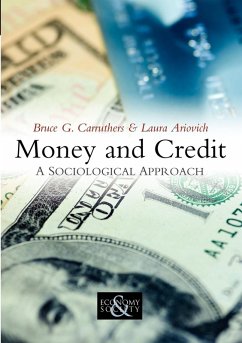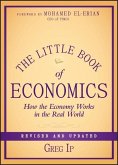This book offers a fresh and uniquely sociological perspective on money and credit. As basic economic institutions, money and credit are easy to overlook when they work well. When they malfunction, as they did in the new millennium's global financial crisis, their importance becomes obvious and demands further investigation.
Bruce Carruthers and Laura Ariovich examine the social dimensions of money and credit at both the individual and corporate levels, from the development of personal credit and a consumer society, to the role of government in the creation of money. In clear prose, they illustrate how the overall future of the economy is governed by the financial system and the flow of capital into, and out of, firms operating in particular industrial sectors, as well as the social meanings money itself acquires and the ways people distinguish between "dirty" and "clean" money.
This accessible and engaging book will be essential reading for upper-level students of economic sociology, and those interested in how the bills, coins and plastic in our pockets shape the world we live in.
Hinweis: Dieser Artikel kann nur an eine deutsche Lieferadresse ausgeliefert werden.
Bruce Carruthers and Laura Ariovich examine the social dimensions of money and credit at both the individual and corporate levels, from the development of personal credit and a consumer society, to the role of government in the creation of money. In clear prose, they illustrate how the overall future of the economy is governed by the financial system and the flow of capital into, and out of, firms operating in particular industrial sectors, as well as the social meanings money itself acquires and the ways people distinguish between "dirty" and "clean" money.
This accessible and engaging book will be essential reading for upper-level students of economic sociology, and those interested in how the bills, coins and plastic in our pockets shape the world we live in.
Hinweis: Dieser Artikel kann nur an eine deutsche Lieferadresse ausgeliefert werden.
"Money and Credit offers a pithy, fast-moving introduction to the sociology of money and credit, chronicling where modern monetary systems came from, how people assign social meaning to money, how consumer and corporate credit markets developed, and how the current system of credit operates for families and Fortune-500 companies alike. Carruthers and Ariovich provide insights not only into how modern currency and credit markets work, but into why they sometimes fail to stabilize value or to ensure that credit is given only where credit is due. This lucid and engaging book should be required reading for students of economic sociology." -- Frank Dobbin, Harvard University
"Few books succeed in being both scholarly studies and textbooks at one and the same time, but Money and Credit is an exception. Written in an engaging and easy style, and full of interesting and important information on money and credit from early history to the current financial crisis, this important book will appeal to a wide audience. It is also likely to become the standard work in the sociology of money and credit." -- Richard Swedberg, Cornell University
"Carruthers and Ariovich view the mysteries of money and credit through a distinctively sociological lens. They treat this complex and difficult subject in a way that is illuminating, accessible, and concise, yet subtle and sophisticated - the gold standard of academic writing." -- Mark Granovetter, Stanford University
"Few books succeed in being both scholarly studies and textbooks at one and the same time, but Money and Credit is an exception. Written in an engaging and easy style, and full of interesting and important information on money and credit from early history to the current financial crisis, this important book will appeal to a wide audience. It is also likely to become the standard work in the sociology of money and credit." -- Richard Swedberg, Cornell University
"Carruthers and Ariovich view the mysteries of money and credit through a distinctively sociological lens. They treat this complex and difficult subject in a way that is illuminating, accessible, and concise, yet subtle and sophisticated - the gold standard of academic writing." -- Mark Granovetter, Stanford University








